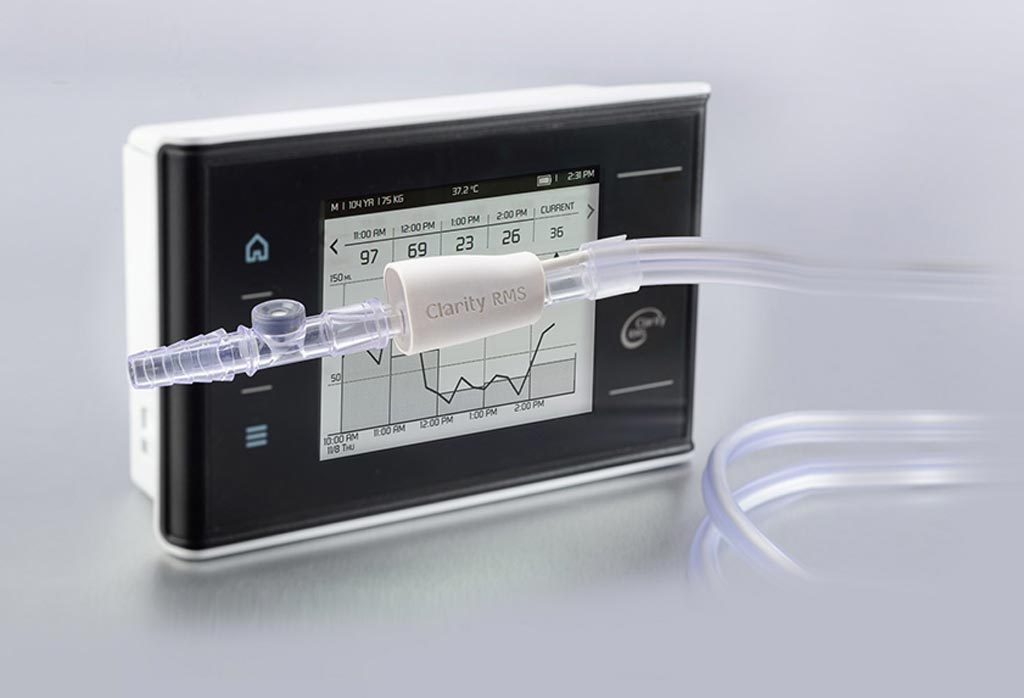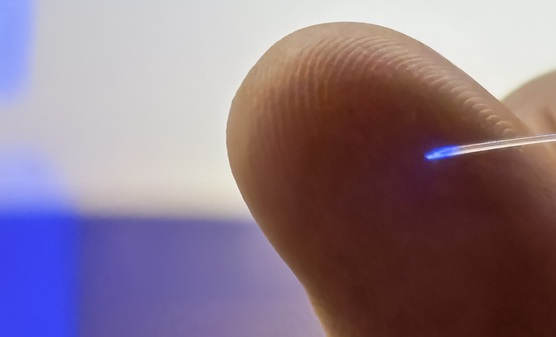Critical Care System Helps Monitor Urine Flow
|
By HospiMedica International staff writers Posted on 12 Aug 2019 |

Image: A new urine flow monitor protects against kidney injury (Photo courtesy of RenalSense).
A novel diagnostics system provides real-time monitoring of urine flow in critical care and peri-operative settings.
The RenalSense (Jerusalem, Israel) Clarity RMS system is an innovative system designed to continuously monitor urine flow. The system uses sophisticated sensor technology and proprietary algorithms in order to measure non-homogeneous, time-varying liquids, even in unstable, uncontrolled environments, automatically transmitting real-time data to medical staff on a 24/7 basis. The approach, which involves complex numeric techniques, is based on an in-depth understanding of fluid dynamics, thermodynamics, human physiology, and target environment properties.
The patented sensor measures, analyzes, and interprets the continuously changing composition and flow volume of urine, generating a unique set of electronic signals that represent ongoing changes in renal function. Proprietary algorithms separate the “noise” from these signals with high sensitivity and stability, achieving clear recognition and correct interpretation of different processes in the extremely dynamic environment. Timely alerts of fluctuations provide an early warning sign of acute kidney injury (AKI) risk, facilitating rapid intervention.
“We've known for years that urine output information is essential for management of critical care patients. The time has come for urine output to be monitored electronically in real-time, as is the standard practice for other vital signs in the ICU,” said Professor John Kellum, MD, of the University of Pittsburgh Medical Center (UPMC, PA, USA).
AKI is common among intensive care unit (ICU) patients, with a broad spectrum of clinical presentations ranging from mild to severe injury that may result in permanent and complete loss of renal function and high mortality. The underlying mechanisms of AKI include a decrease in the kidney's ability to excrete nitrogenous waste, manage electrolytes, regulate intravascular volume, and assist with maintenance of the acid-base status via urine excretion.
Related Links:
RenalSense
University of Pittsburgh Medical Center
The RenalSense (Jerusalem, Israel) Clarity RMS system is an innovative system designed to continuously monitor urine flow. The system uses sophisticated sensor technology and proprietary algorithms in order to measure non-homogeneous, time-varying liquids, even in unstable, uncontrolled environments, automatically transmitting real-time data to medical staff on a 24/7 basis. The approach, which involves complex numeric techniques, is based on an in-depth understanding of fluid dynamics, thermodynamics, human physiology, and target environment properties.
The patented sensor measures, analyzes, and interprets the continuously changing composition and flow volume of urine, generating a unique set of electronic signals that represent ongoing changes in renal function. Proprietary algorithms separate the “noise” from these signals with high sensitivity and stability, achieving clear recognition and correct interpretation of different processes in the extremely dynamic environment. Timely alerts of fluctuations provide an early warning sign of acute kidney injury (AKI) risk, facilitating rapid intervention.
“We've known for years that urine output information is essential for management of critical care patients. The time has come for urine output to be monitored electronically in real-time, as is the standard practice for other vital signs in the ICU,” said Professor John Kellum, MD, of the University of Pittsburgh Medical Center (UPMC, PA, USA).
AKI is common among intensive care unit (ICU) patients, with a broad spectrum of clinical presentations ranging from mild to severe injury that may result in permanent and complete loss of renal function and high mortality. The underlying mechanisms of AKI include a decrease in the kidney's ability to excrete nitrogenous waste, manage electrolytes, regulate intravascular volume, and assist with maintenance of the acid-base status via urine excretion.
Related Links:
RenalSense
University of Pittsburgh Medical Center
Latest Critical Care News
- Specialized Dressing with Sensor Monitors pH Levels in Chronic Wounds
- AI Model Could Help Diagnose Spinal Cord Disease Up To 30 Months Earlier
- 3D-Printed Swallowable Robot Could Perform Gastrointestinal Procedures
- Next-Gen Hydrogel Could Transform Soft Tissue and Organ Repair
- Engineered Cancer Eating Bacteria Consume Tumors from Inside Out
- ‘Cyborg’ Transplants Could Replace Pancreatic Tissue Damaged by Diabetes
- Smartphone-Linked Catheter Sensor Spots UTIs Sooner Than Lab Cultures
- AI Tool Identifies Trauma Patients Requiring Blood Transfusions Before Reaching Hospital
- New Clinical Guidelines to Reduce Central Line-Associated Bloodstream Infection
- New Inhalable Treatment for TB Lowers Side Effects
- AI Algorithm Improves Antibiotic Decision-Making in Urinary Tract Infection
- 3D-Printed System Enhances Vaccine Delivery Via Microneedle Array Patch
- Whole-Heart Mapping Technology Provides Comprehensive Real-Time View of Arrhythmias
- Wearable Device for Diabetics Could Replace Continuous Glucose Monitoring Systems
- AI Stethoscope Spots Heart Valve Disease Earlier Than GPs
- Bioadhesive Patch Eliminates Cancer Cells That Remain After Brain Tumor Surgery
Channels
Artificial Intelligence
view channelSurgical Techniques
view channel
Brain Implant Records Neural Signals and Delivers Precise Medication
Neurological diseases such as epilepsy involve complex interactions across multiple layers of the brain, yet current implants can typically stimulate or record activity from only a single point.... Read moreAI-Based OCT Image Analysis Identifies High-Risk Plaques in Coronary Arteries
Lipid-rich plaques inside coronary arteries are strongly associated with heart attacks and other major cardiac events. While optical coherence tomography (OCT) provides detailed images of vessel structure... Read moreNeural Device Regrows Surrounding Skull After Brain Implantation
Placing electronic implants on the brain typically requires removing a portion of the skull, creating challenges for long-term access and safe closure. Current methods often involve temporarily replacing the skull or securing metal plates, which can lead to complications such as skin erosion and additional surgeries.... Read morePatient Care
view channel
Revolutionary Automatic IV-Line Flushing Device to Enhance Infusion Care
More than 80% of in-hospital patients receive intravenous (IV) therapy. Every dose of IV medicine delivered in a small volume (<250 mL) infusion bag should be followed by subsequent flushing to ensure... Read more
VR Training Tool Combats Contamination of Portable Medical Equipment
Healthcare-associated infections (HAIs) impact one in every 31 patients, cause nearly 100,000 deaths each year, and cost USD 28.4 billion in direct medical expenses. Notably, up to 75% of these infections... Read more
Portable Biosensor Platform to Reduce Hospital-Acquired Infections
Approximately 4 million patients in the European Union acquire healthcare-associated infections (HAIs) or nosocomial infections each year, with around 37,000 deaths directly resulting from these infections,... Read moreFirst-Of-Its-Kind Portable Germicidal Light Technology Disinfects High-Touch Clinical Surfaces in Seconds
Reducing healthcare-acquired infections (HAIs) remains a pressing issue within global healthcare systems. In the United States alone, 1.7 million patients contract HAIs annually, leading to approximately... Read moreHealth IT
view channel
EMR-Based Tool Predicts Graft Failure After Kidney Transplant
Kidney transplantation offers patients with end-stage kidney disease longer survival and better quality of life than dialysis, yet graft failure remains a major challenge. Although a successful transplant... Read more
Printable Molecule-Selective Nanoparticles Enable Mass Production of Wearable Biosensors
The future of medicine is likely to focus on the personalization of healthcare—understanding exactly what an individual requires and delivering the appropriate combination of nutrients, metabolites, and... Read moreBusiness
view channel
Medtronic to Acquire Coronary Artery Medtech Company CathWorks
Medtronic plc (Galway, Ireland) has announced that it will exercise its option to acquire CathWorks (Kfar Saba, Israel), a privately held medical device company, which aims to transform how coronary artery... Read more
Medtronic and Mindray Expand Strategic Partnership to Ambulatory Surgery Centers in the U.S.
Mindray North America and Medtronic have expanded their strategic partnership to bring integrated patient monitoring solutions to ambulatory surgery centers across the United States. The collaboration... Read more
FDA Clearance Expands Robotic Options for Minimally Invasive Heart Surgery
Cardiovascular disease remains the world’s leading cause of death, with nearly 18 million fatalities each year, and more than two million patients undergo open-heart surgery annually, most involving sternotomy.... Read more















